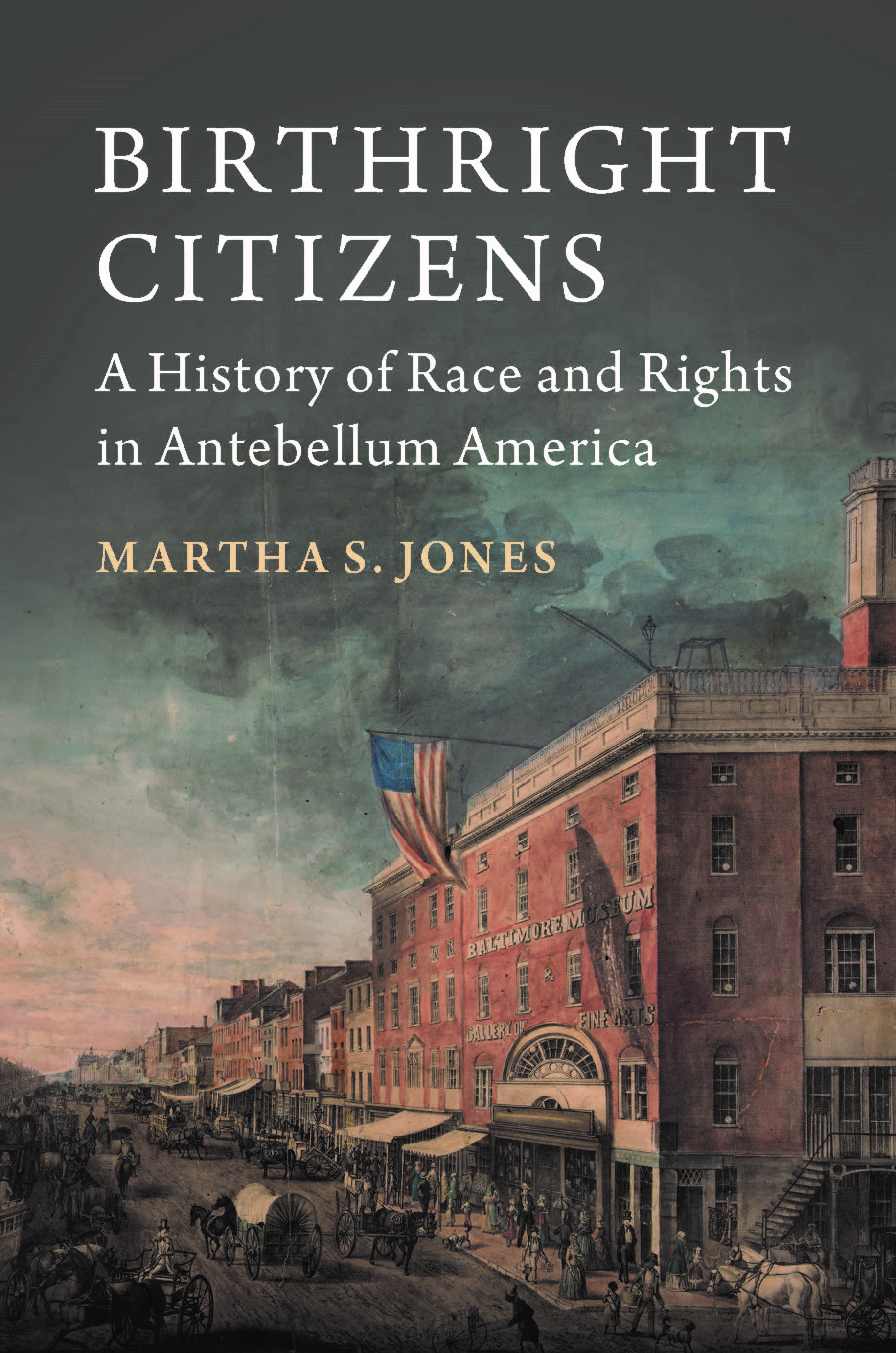‘Birthright Citizens’: A New Book on the History of Race and Rights
*This post is part of our blog series that announces the publication of selected new books in African American History and African Diaspora Studies. Birthright Citizens: A History of Race and Rights in Antebellum America was recently published by Cambridge University Press.
***
The author of Birthright Citizens is Martha S. Jones, the Society of Black Alumni Presidential Professor and Professor of History at Johns Hopkins University. She is the author of the recently published Birthright Citizens: A History of Race and Rights in Antebellum America (Cambridge University Press, 2018) and All Bound Up Together: The Woman Question in Antebellum Public Culture, 1830-1900 (University of North Carolina Press, 2007), and a co-editor of Toward an Intellectual History of Black Women (University of North Carolina Press, 2015). She is a president of the Berkshire Conference of Women Historians and a member of the Organization of American Historians executive committee. She is currently at work on a biography of U.S. Supreme Court Chief Justice Roger B. Taney. Follow her on Twitter @marthasjones_.
Before the Civil War, colonization schemes and Black laws threatened to deport former slaves born in the United States. Birthright Citizens recovers the story of how African American activists remade national belonging through battles in legislatures, conventions, and courthouses. They faced formidable opposition, most notoriously from the US Supreme Court decision in Dred Scott.
Still, Martha S. Jones explains, no single case defined their status. Former slaves studied law, secured allies, and conducted themselves like citizens, establishing their status through local, everyday claims. All along they argued that birth guaranteed their rights. With fresh archival sources and an ambitious reframing of constitutional law-making before the Civil War, Jones shows how the Fourteenth Amendment constitutionalized the birthright principle, and black Americans’ aspirations were realized. Birthright Citizens tells how African American activists radically transformed the terms of citizenship for all Americans.
In this exacting study, legal historian Martha S. Jones reinterprets the Dred Scott decision through a fresh and utterly revealing lens, reframing this key case as just one moment in a long and difficult contest over race and rights…Part meditation on a great nineteenth-century city, part implicit reflection on contemporary immigration politics, and part historical-legal thriller, ‘Birthright Citizens’ is an astonishing revelation of the intricacies and vagaries of Black struggles for the rights of citizenship. —Tiya Miles, Professor of History at Harvard University
Melissa Shaw: Books have creation stories. Please share with us the creation story of your book—those experiences,
Martha S. Jones: Birthright Citizens was born out of skepticism: No one U.S. Supreme Court case, I thought, could explain race and citizenship before the Civil War. Dred Scott v. Sandford said that no Black person was a citizen of the U.S., but I thought there was more.
Black people, I learned, thought they had rights as citizens, and they acted like it in the local courthouse. Yes, they were subject to criminal and Black law enforcement. But they were also securing licenses and permits, filing writs of habeas corpus, and petitioning using state law. And what they got looked like rights: the ability to own guns, travel, enforce contracts, and haul white men into court when they violated apprenticeship agreements. I even found them testifying against the interests of white people. None of this was hinted at in Dred Scott.
Legal elites, I discovered, were unsure about the status of former slaves. I read the papers of judges, lawyers and legislators and learned that they disagreed. Some thought former slaves had no rights. Most encouraged Black litigants to use the law, if in limited ways. They nearly all endorsed colonization: Slavery might end, but there was no future for Black people as members of the body politic. Their removal was the ultimate goal. Dred Scott had not admitted this murky state of affairs.
What was the relationship between these two legal cultures? Did highly placed lawmakers understand the claims of Black Americans? I was still thinking about Dred Scott when I encountered Cornelius Thompson who, if he wanted to leave his home state and later return, needed a permit endorsed by three white references. There on Thompson’s application was the signature of Chief Justice Roger Taney, the author of Dred Scott. Taney not only worked closely with Thompson. He knew about Thompson’s legal aspirations – the right to travel – and his ability realize them in court – despite Taney’s view that Thompson had no rights at all.
Now I saw Dred Scott in a new way. Rather than a distant decision of a high court, Dred Scott reflected what Taney learned through his associations with men like Thompson. When it came to citizenship, the distance between the ideas of Black activists and elite lawmakers was not as far as we once thought. Black citizenship, it turned out, was a battlefield rather than a settled matter in antebellum America. But I had to take Thompson as seriously as Taney to discover that part of the story.


